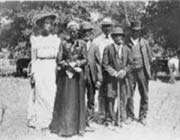The Day in History:
First Juneteenth Celebrations (1865)

Juneteenth, also known as Freedom Day or Emancipation Day, is an annual holiday or holiday observance in 26 states of the United States. Celebrated on June 19, it commemorates the announcement of the abolition of slavery in Texas. The holiday originated in Galveston, Texas; for more than a century, the state of Texas was the primary home of Juneteenth celebrations. However, one small community in Arkansas (Wilmar) boasts that its celebration, called "June Dinner" has been consistently observed and celebrated, except for one year, since approximately 1870. Since 1980, Juneteenth has been an official state holiday in Texas. It is considered a "partial staffing holiday" meaning that state offices do not close but some employees will be using a floating holiday to take the day off. Twelve other states list it as an official holiday, including Arkansas, New York, Massachusetts, Connecticut, and Alaska . In California, Governor Schwarzenegger proclaimed June 19th "Juneteenth" on June 19, 2005. However, some of these states, such as Connecticut, do not consider it a legal holiday and do not close government offices in observance of the occasion. Its informal observance has spread to some other states, with a few celebrations even taking place in other countries.
As of June 2008, 29 states have recognized Juneteenth as either a state holiday or state holiday observance; these include Texas, Oklahoma, Florida, Delaware, Idaho, Alaska, Iowa, California, Wyoming, Missouri, Connecticut, Illinois, Louisiana, New Jersey, New York, Colorado, Arkansas, Oregon, Kentucky, Michigan, New Mexico, Virginia, Washington, Tennessee, Massachusetts, Vermont and North Carolina, as well as the District of Columbia.
History
Though the Emancipation Proclamation had been issued on September 22, 1862, with an effective date of January 1, 1863, it had little immediate effect on most slaves’ day-to-day lives, particularly in Texas, which was almost entirely under Confederate control. Juneteenth commemorates June 19, 1865, the day Union General Gordon Granger and 2,000 federal troops arrived on Galveston Island to take possession of the state and enforce the emancipation of its slaves. Legend has it while standing on the balcony of Galveston’s Ashton Villa, Granger read the contents of “General Order No. 3”
The people of Texas are informed that, in accordance with a proclamation from the Executive of the United States, all slaves are free. This involves an absolute equality of personal rights and rights of property between former masters and slaves, and the connection heretofore existing between them becomes that between employer and hired labor. The freedmen are advised to remain quietly at their present homes and work for wages. They are informed that they will not be allowed to collect at military posts and that they will not be supported in idleness either there or elsewhere.
That day has since become known as Juneteenth, a name derived from a portmanteau of the words June and nineteenth.
Former slaves in Galveston rejoiced in the streets with jubilant celebrations. Juneteenth celebrations began in Texas the following year. Across many parts of Texas, freed people pooled their funds to purchase land specifically for their communities’ increasingly large Juneteenth gatherings—including Houston’s Emancipation Park, Mexia’s Booker T. Washington Park, and Emancipation Park in Austin. Juneteenth celebrations include a wide range of festivities, such as parades, street fairs, cookouts, or park parties and include such things as music and dancing or even contests of physical strength and intellect. Baseball and other popular American games may also be played.
Juneteenth is mentioned in the writings of Sojourner Truth as a day when the slaves of New York State could celebrate one day of freedom. She reports in her writings that the parties and celebrations were such that she even considered giving up her freedom to be able to take part. This can be found in "The diary of Sojourner Truth".
In literature
Ralph Ellison"s second novel Juneteenth deals with this holiday and its traditions. Juneteenth was published posthumously, from a manuscript which required heavy editing (and paring) after Ellison"s death.
Carolyn Meyer"s novel Jubilee Journey is the story of one young biracial girl celebrating Juneteenth with her relatives in Texas, while also learning to be proud of her African American heritage.
Ann Rinaldi"s historical novel Come Juneteenth is the story of how Juneteenth came to be, and follows the life of the daughter of a young white plantation-owner"s daughter in Texas during the Civil War whose family faces tragedy after their mulatto half-sister runs away when learning they lied to her about being free.
TraditionsJuneteenth is traditionally celebrated with a large feast served as an all day meal in a park or outdoor space. The traditional dishes of Juneteenth are served pot luck and usually include portions of barbecue, cakes, and pies.
Source: encyclopedia.thefreedictionary.com
Other Links:
The Day in History: Zoot Suit Riots Come to an End (1943)
The Day in History: Icelands Laki Volcano Begins 9-Month-Long Eruption (1783)
The Day in History: Sir Charles Kingsford Smith Completes First Transpacific Flight (1928)